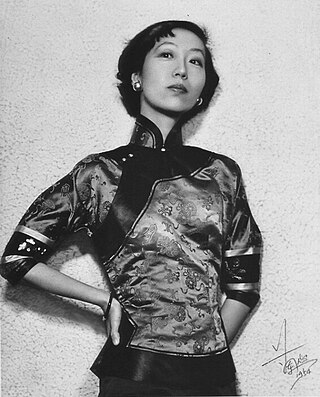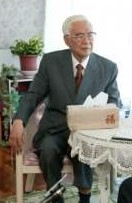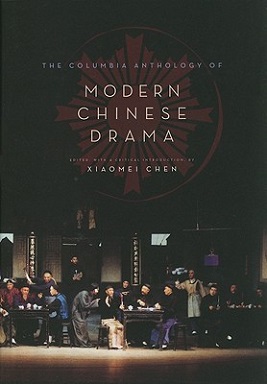Related Research Articles

Eileen Chang (traditional Chinese: 張愛玲; simplified Chinese: 张爱玲; pinyin: Zhāng Àilíng; Wade–Giles: Chang1 Ai4-ling2;September 30, 1920 – September 8, 1995), also known as Chang Ai-ling or Zhang Ailing, or by her pen name Liang Jing (梁京), was a Chinese-born American essayist, novelist, and screenwriter.
The history of Chinese literature extends thousands of years, and begins with the earliest recorded inscriptions, court archives, building to the major works of philosophy and history written during the Axial Age. The Han and Tang dynasties were considered golden ages of poetry, while the Song (960–1279) and Yuan (1271–1368) were notable for their lyrics (ci), essays, dramas, and plays. During the Ming and Qing, mature novels were written in written vernacular Chinese, an evolution from the preeminence of Literary Chinese patterned off the language of the Chinese classics. The introduction of widespread woodblock printing during the Tang and the invention of movable type printing by Bi Sheng (990–1051) during the Song rapidly spread written knowledge throughout China. Around the turn of the 20th century, the author Lu Xun (1881–1936) is considered an influential voice of vernacular Chinese literature.

Japanese literature throughout most of its history has been influenced by cultural contact with neighboring Asian literatures, most notably China and its literature. Early texts were often written in pure Classical Chinese or lit. 'Chinese writing', a Chinese-Japanese creole language. Indian literature also had an influence through the spread of Buddhism in Japan.

Bo Yang, sometimes also erroneously called Bai Yang, was a Chinese historian, novelist, philosopher, poet based in Taiwan. He is also regarded as a social critic. His best-known work is The Ugly Chinaman, a controversial book that was banned in Mainland China; in it he harshly criticized Chinese culture and the national character of Chinese people. According to his own memoir, the exact date of his birthday was unknown even to himself. He later adopted 7 March, the date of his 1968 imprisonment, as his birthday.
Hong Kong literature is 20th-century and subsequent writings from or about Hong Kong or by writers from Hong Kong, primarily in the poetry, performance, and fiction media. Hong Kong literature reflects the area's unique history during the 20th century as a fusion of British colonial, Cantonese, and sea-trading culture. It has mainly been written in Vernacular Chinese and, to a lesser extent, English.

Zheng Keshuang, Prince of Yanping, courtesy name Shihong, art name Huitang, was the third and last ruler of the Kingdom of Tungning in Taiwan in the 17th century. He was the second son of Zheng Jing and a grandson of Koxinga. After surrendering to the Qing dynasty in 1683, he was ennobled as Duke of Hanjun (漢軍公), and lived the rest of his life in Beijing.
Taiwanese literature refers to the literature written by Taiwanese in any language ever used in Taiwan, including Japanese, Taiwanese Han and Austronesian languages.

Huang Chun-ming is a Taiwanese literary figure and teacher. Huang writes mainly about the tragic and sometimes humorous lives of ordinary Taiwanese people, and many of his short stories have been turned into films, including The Sandwich Man (1983).

Loa Ho, real name Loa Ho (賴河) and Lai Kuie-ho, pen name Lan Yun, Fu San, An Tu-shêng, Hui, Tsou Chieh-hsien, Kung I-Chi, Lang, etc., was a Taiwanese poet who was born in Changhua County, Taiwan Prefecture, Fujian-Taiwan Province, Qing dynasty. He was a medical doctor but was also a writer, poet, surgeon, and social activist from Changhua, Taiwan, having had enormous fame in literature. He founded the literature and arts column of The Taiwan Minpao and served as its editor-in-chief.
Chen Ruoxi is a Taiwanese author. A graduate of National Taiwan University, she among others helped found the literary journal Xiandai wenxue.

Liang Shih-chiu, also romanized as Liang Shiqiu, and also known as Liang Chih-hwa (梁治華), was a renowned educator, writer, translator, literary theorist and lexicographer.
Hsia Chih-tsing, or C. T. Hsia, was a Chinese historian and literary theorist. He contributed to the introduction of modern Chinese literature to the Western world by promoting the works of once marginalized writers in the 1960s. Today, C. T. Hsia is considered one of the most important critics of Chinese literature.
David Der-wei Wang is a literary historian, critic, and the Edward C. Henderson Professor of Chinese Literature at Harvard University. He has written extensively on post-late Qing Chinese fiction, comparative literary theory, colonial and modern Taiwanese literature, diasporic literature, Chinese Malay literature, Sinophone literature, and Chinese intellectuals and artists in the 20th century. His notions such as "repressed modernities", "post-loyalism", and "modern lyrical tradition" are instrumental and widely discussed in the field of Chinese literary studies.
Chinese science fiction is genre of literature that concerns itself with hypothetical future social and technological developments in the Sinosphere.

Howard Goldblatt is a literary translator of numerous works of contemporary Chinese fiction, including The Taste of Apples by Huang Chunming and The Execution of Mayor Yin by Chen Ruoxi. Goldblatt also translated works of Chinese novelist and 2012 Nobel Prize in Literature winner Mo Yan, including six of Mo Yan's novels and collections of stories. He was a Research Professor of Chinese at the University of Notre Dame from 2002 to 2011.
Hualing Nieh Engle, née Nieh Hua-ling, is a Chinese novelist, fiction writer, and poet. She is a professor emerita at the University of Iowa.
Chinese crime fiction is an umbrella term which generally refers to Sinophone literature concerned with the investigation and punishment of criminal acts. In mainland China the most popular subgenre is "detective fiction".
Modern Chinese poetry, including New poetry, refers to post Qing dynasty Chinese poetry, including the modern vernacular (baihua) style of poetry increasingly common with the New Culture and 4 May 1919 movements, with the development of experimental styles such as "free verse" ; but, also including twentieth and twenty-first century continuations or revivals of Classical Chinese poetry forms. Some modern Chinese poetry represents major new and modern developments in the poetry of one of the world's larger areas, as well as other important areas sharing this linguistic affinity. One of the first poets and theorist in the modern Chinese poetry mode was Hu Shih (1891–1962).

The Columbia Anthology of Modern Chinese Drama is a 2010 book edited and introduced by Xiaomei Chen and published by the Columbia University Press.

The Big Red Book of Modern Chinese Literature is an anthology of Chinese literature edited by Yunte Huang and published in 2016 by W. W. Norton & Company. Huang, a professor of English at the University of California, Santa Barbara, described the book as a "search for the soul of modern China" in the introduction.
References
- Fisac, Taciana (Autonomous University of Madrid). "The Columbia Anthology of Modern Chinese Literature" (review). China Review International , E ISSN 1527-9367, 09/1996, Volume 3, Issue 2, pp. 476 – 477. Available from Project MUSE. - DOI 10.1353/cri.1996.0067
- Huang, Martin W. (University of California, Irvine). "The Columbia Anthology of Modern Chinese Literature" (book review). The Journal of Asian Studies , ISSN 0021-9118, 11/1995, Volume 54, Issue 4, pp. 1089–1090. - DOI 10.2307/2059966
- McDougall, Bonnie S. "The Columbia Anthology of Modern Chinese Literature" (book review). The China Quarterly , ISSN 0305-7410, 06/1996, Issue 146, pp. 654 – 656. Available from HeinOnline.
- Williams, Philip F. (Autumn 1995). "Reviewed Work: The Columbia Anthology of Modern Chinese Literature by Joseph S. M. Lau, Howard Goldblatt". World Literature Today . Board of Regents of the University of Oklahoma. 69 (4, Focus on Luisa Valenzuela): 868–869. doi:10.2307/40151809. JSTOR 40151809.